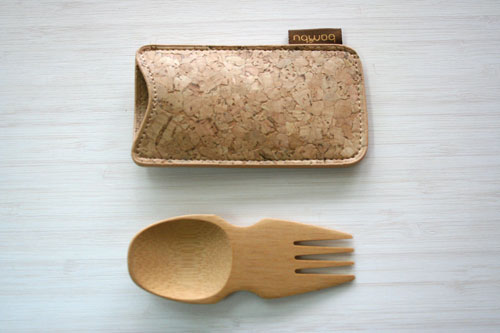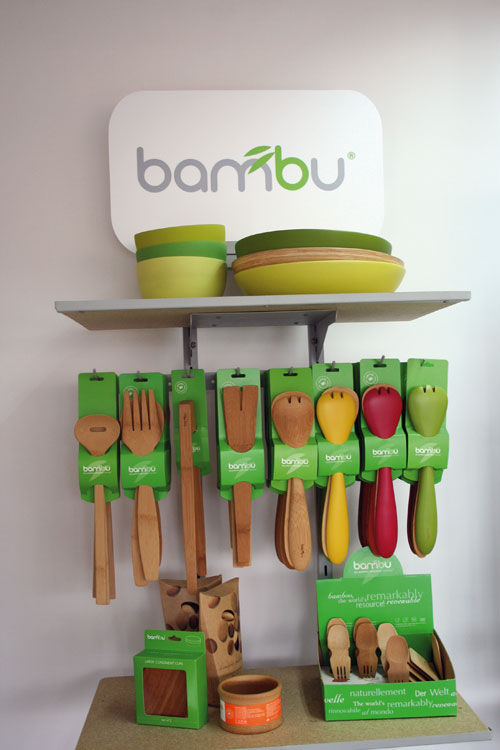 A Portland couple moved to Asia to find adventure and business opportunities. Fifteen years later, their sustainable housewares company is thriving.
A Portland couple moved to Asia to find adventure and business opportunities. Fifteen years later, their sustainable housewares company is thriving.
A Portland couple moved to Asia to find adventure and business opportunities. Fifteen years later, their sustainable housewares company is thriving.
BY ADRIANNE JEFFRIES
 |
Jeff Delkin and Rachel Speth in their office in Shanghai’s Jing An business district.PHOTOS COURTESY OF BAMBU |
Jeff Delkin and Rachel Speth walk to work every day from their apartment in Shanghai’s former French Concession neighborhood, sticking to tree-lined streets to bypass the chaos of traffic and construction on their way to a clean but leaky office in the Jing An business district. The walk is part of what makes living in this smoggy concrete jungle tolerable for the former Portlanders, who gave up their favorite pastimes — fly fishing on the Deschutes and skiing on Mt. Hood — in order to work in China.
“It’s bright, it’s chaos, it’s just a sensory overload,” says Delkin, a tall, smartly dressed 49-year-old who races his assistant to the door when the bell rings. “But it’s so neat because it’s like being a kid in kindergarten and you learn everything is new. ‘Where do I shop? Where do I eat? Where does this thing go?’ You have to have a sense of curiosity and adventure to make it fulfilling and enjoyable.”
Delkin and his wife work in a busy office complex that, like the rest of Shanghai, is half under construction. Workers chip at the sidewalks around the entrance with no obvious mission, in an unhurried way that suggests they’re doing make-work paid for by the recent government stimulus package. The couple’s company, Bambu, is housed at the back, on the second floor, where wide windows look out over the construction mess in the courtyard and beyond, to the yellow cranes hanging over half-finished skyscrapers in the distance. The suite is spare, tidy and very white. Delkin, whose first career was in advertising, is the front man for the operation; Speth is a slim 48-year-old with long black hair who always seems to be busy off-screen. On this damp winter day she looks comfortable in an enormous scarf.
Their adventure started 15 years ago, when Speth worked in product development at Nike. The company was expanding into Asia and needed volunteers to go overseas. “Jeff and I have always enjoyed traveling and at every opportunity we would go to Mexico and explore and be in other cultures, so we knew that appealed to us,” Speth says. “We put our name in the hat and said, ‘Hey, we’d be interested in going overseas.’ We really didn’t have a preference where.”
 |
Bambu spork and cork pouch |
Nike brought them first to Taiwan, then to China, then to Thailand. Delkin worked on Coke and other large accounts for ad agency Leo Burnett before he got a job with Asian marketing giant Ogilvy and moved to Hong Kong for a year. He and Speth decided seven years ago to settle down and open Bambu, a sustainable housewares company inspired by bamboo items they’d seen on their travels. They set up shop in Shanghai, a city of 19 million and the commercial center of mainland China.
“Living in Thailand put some perspective to China for us,” Delkin says. “The Chinese are very industrious, eager to learn, interested in foreigners and their experience and their skills…in sharp contrast to what we were living and experiencing in Thailand where it’s hot, people aren’t that ambitious, they don’t take particularly well to outside influences. The Chinese are terribly ambitious and so that was wonderful. It suits Rachel’s and my personalities quite well.”
Bamboo is common in the U.S. now, but for years it was not a widely used material. Meanwhile, Delkin and Speth noticed that people in China, Vietnam, Nepal and Japan were using bamboo for baskets, cutlery, furniture and other useful things. Speth started designing clever bamboo products for Americans that retail for as low as $9.99. The “Give It A Rest” utensil series incorporates bamboo’s natural protruding rings into a support that keeps the business end of a resting spoon from touching the table. Another collection, “Veneerware,” is a biodegradable alternative to plastic forks and plates.
 Retailers and consumers loved the bamboo ware immediately. The products are sold at New Seasons, Whole Foods, the Portland Art Museum gift shop, other stores in North America and online. Bambu has nine employees (including Delkin and Speth)and made more than $3 million in revenue in 2008 (Delkin wouldn’t give numbers for 2009, when he says business waned). Speth designs the products, which are made from bamboo, cork and coconut. Delkin handles marketing.
Retailers and consumers loved the bamboo ware immediately. The products are sold at New Seasons, Whole Foods, the Portland Art Museum gift shop, other stores in North America and online. Bambu has nine employees (including Delkin and Speth)and made more than $3 million in revenue in 2008 (Delkin wouldn’t give numbers for 2009, when he says business waned). Speth designs the products, which are made from bamboo, cork and coconut. Delkin handles marketing.
“Bambu’s tagline is “design, function, value,’ and we back that up with green credentials,” he says. The company is a member of 1% For the Planet and the bamboo for many products is certified organic by the Swiss Institute for Marketecology.
But sometimes the infamous “Made in China” label catches up with them. Delkin acknowledges that the stereotype for poor quality is sometimes true, pointing to a rejected “Give It A Rest” spatula that lies flat on the table despite its support. But China is where bamboo is grown, and although they speak only “survival Chinese,” Delkin and Speth are closely involved in each stage of production. Speth spent three years hunting for farmers and craftspeople she could trust to do good work and not resell the product designs, a chronic problem in China, where intellectual property protections are lax. Bambu has been working with the same producers for the life of the company, some of whom work exclusively for Bambu. But careful oversight is still necessary to ensure, for example, that woodworking shops are properly ventilated or that suppliers use recycled packing material instead of Styrofoam. It’s not easy being green here, but turn over any of Bambu’s sporks, pot scrapers or salad tossers and you’ll see a tiny tag: “Proudly made in China.”
“If you’re going to do business in China, you’ve got to be here,” Delkin says. “If not permanently then regularly. Things can go sideways so easily here.” He places a pretty rectangle of refined bamboo into the palm of his hand to illustrate this point. The design was for a large cutting board; the prototype came back the size of an ashtray.
 |
Bambu’s home and kitchen products |
Delkin calls Shanghai a city of “strivers,” and the same could be said about him and his wife. The two haven’t stopped moving even though they’ve settled down. They spend much of their time checking up on their factories in China and Vietnam and making the rounds at trade shows in the U.S. They seem to thrive on upheaval, appearing energetic even when they claim to be exhausted.
And despite the frustrations of living in China — endless construction, banks that still rely on triplicate, and vegetarian dishes with tiny bits of meat hidden in them — Delkin and Speth feel very much at home here. They have a favorite restaurant and a favorite wine bar and a circle of ex-pat friends from all over the world. They donated furniture and basketballs to a school near one of their factories and gave wheelchairs to disabled basket weavers in Vietnam. And most tellingly, they recently changed Bambu’s status under China’s law from Representative Office, a limited entity designed for foreign businesses that want to do quality control or market research in China, to Wholly Foreign Owned Enterprise, which is required to have more capital but can sell to Chinese customers, control local hiring and own factories. Delkin calls the move a “longer-term play.”
“We sit and watch China change before our eyes,” Delkin says. “Living in Shanghai is like living in the center of the universe. You feel like it’s all happening here.”


